Growing anti-Chinese sentiment within Australia poses a serious problem for any move towards normalization, writes Vijay Prashad.
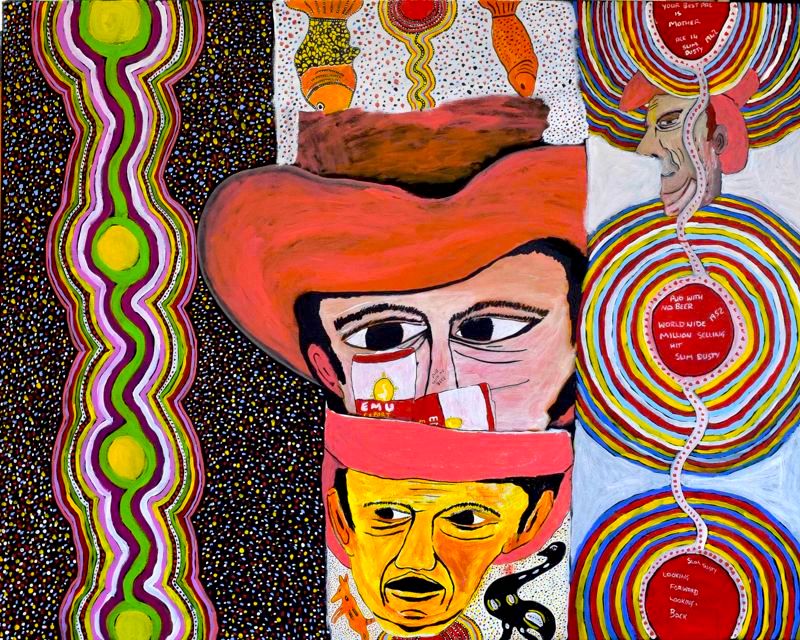
John (Prince) Siddon, Australia, “Slim Dusty, Looking Forward, Looking Back,” 2021.
By Vijay Prashad
Tricontinental: Institute for Social Research
 During the G20 summit in Bali, Indonesia, Australia’s Prime Minister Anthony Albanese told journalists on Nov. 15 his country “seeks a stable relationship with China.”
During the G20 summit in Bali, Indonesia, Australia’s Prime Minister Anthony Albanese told journalists on Nov. 15 his country “seeks a stable relationship with China.”
This is because, as Albanese pointed out, China is “Australia’s largest trading partner … worth more than Japan, the United States, and the Republic of Korea… combined.” Since 2009, China has been Australia’s largest destination for exports as well as the largest single source of Australia’s imports.
For the past six years, China has largely ignored Australia’s requests for meetings due to the latter’s close military alignment with the U.S. But in Bali, China’s President Xi Jinping made it clear that the Chinese-Australian relationship is one to be “cherished.”
When Albanese was asked if Xi raised the issue of Australia’s participation in several military pacts against China, he said that issues of strategic rivalry were “not raised, except for in general comments.”
Former Australian Prime Minister Kevin Rudd recently said that the impetus for the deep freeze between Australia and China six year ago was the “U.S. doctrine of strategic competition.”
This outlook is clarified in the 2022 U.S. National Security Strategy, which asserts that China “is America’s most consequential geopolitical challenge.”
In Bali, U.S. President Joe Biden said that the U.S. and China must “manage the competition responsibly,” which suggested that the U.S. might take a less belligerent posture towards China by not pressuring it through U.S. military pacts in Asia and by reducing the intensification of the crisis over Taiwan. Rudd suggests that Biden’s shift in tone might have given Albanese the opportunity to “reset” relations between Australia and China.
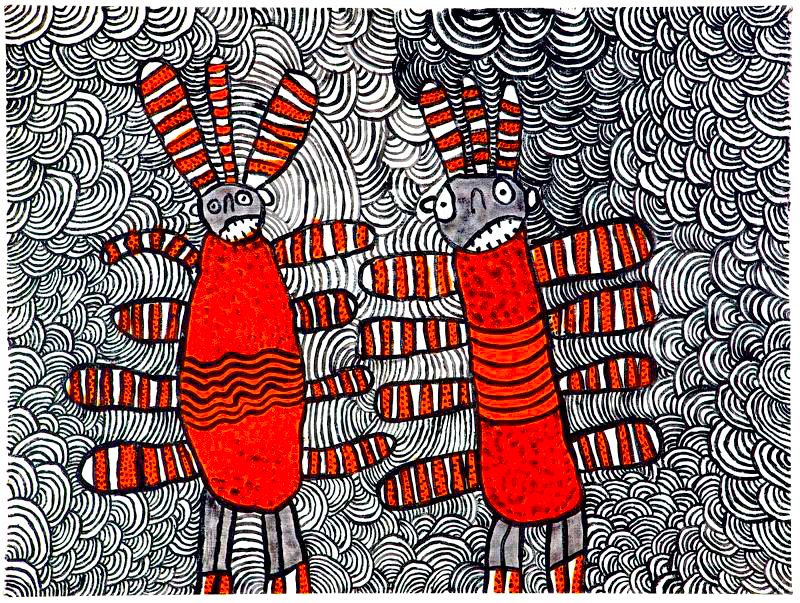
Nura Rupert, Australia, “Mamu” or “Spooky Spirits,” 2002.
Before Albanese left for Bali, however, news broke about a plan to station six U.S. B-52 bombers, which have nuclear weapons capability, in northern Australia at the Tindal air force base.
Additionally, Australia will build 11 large storage tanks for jet fuel, providing the U.S. with refuelling capacity closer to China than its main fuel repository in the Pacific, Hawaii. Construction on this ‘squadron operations facility” would start immediately and be completed by 2026. The $646 million upgrade includes new equipment and improvements to the U.S.-Australian spy base at Pine Gap, where the neighbouring population in Alice Springs worries about being a nuclear target in a war that they simply do not want.
These announcements come as no surprise. U.S. bombers, including B-52s, have visited the base since the 1980s and taken part in U.S.-Australian training operations since 2005.
In 2016, the U.S. commander of its Pacific air forces, General Lori Robinson, said that the U.S. would likely add the B-1 bomber — which has a longer range and a larger payload capacity — to these exercises.
The U.S.-Australian Enhanced Air Cooperation (2011) has already permitted these expansions, although this has routinely embarrassed Australian government officials who would prefer more discretion, in part due to the anti-nuclear sentiment in New Zealand and in many neighbouring Pacific island states that are signatories of the 1986 Treaty of Rarotonga establishing the region as a nuclear-free zone.
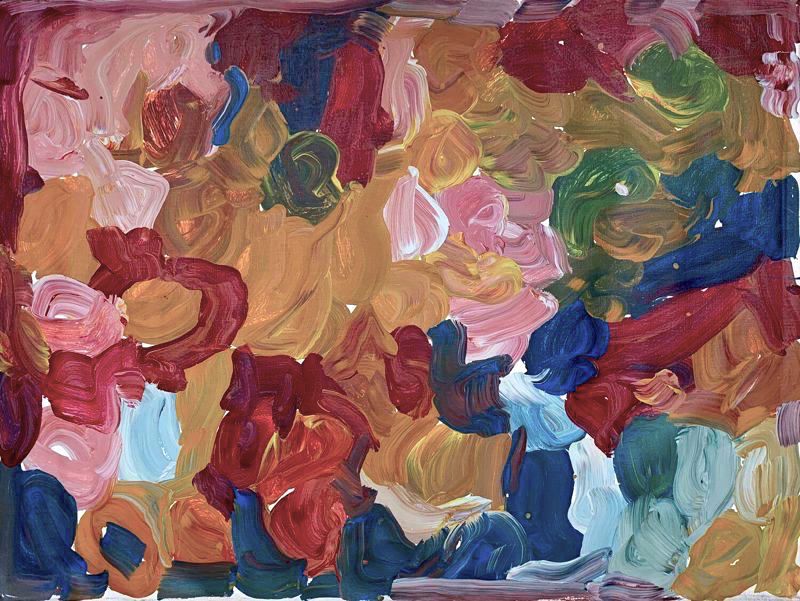
Minnie Pwerle, Australia, “Bush Melon Seed,” 1999.
The expansion of the Tindal air base and the upgrades to Pine Gap spy base are part of the overall deepening of military and strategic ties between the U.S. and Australia. These ties have a long history, but they were formalised by the Australia-New Zealand-United States (ANZUS) Security Treaty of 1951 and Australia’s entry into the Five Eyesintelligence network in 1956.
Since then, the two countries have tightened their security linkages, such as by facilitating the transfer of military equipment from the U.S. arms industry to Australia.
Support CN’s
Winter Fund Drive!
In 2011, U.S. President Barack Obama and Australian Prime Minister Julia Gillard agreed to position a few thousand U.S. Marines in Darwin and Northern Australia and allow U.S. bombers frequent flights to that base. This was part of Obama’s “pivot to Asia,” which signalled the U.S. pressure campaign against China’s economic advancement.
Two new security alignments – the Quadrilateral Security Dialogue (Quad, restarted in 2017) and AUKUS. (2021) – further enhanced these ties.
The Quad brought together India and Japan with Australia and the U.S. Since 1990, Australia has hosted Exercise Pitch Black at Tindal, a military war game on which it has collaborated with various countries.
Since India’s air force joined in 2018 and Japan participated in 2022, all Quad and AUKUS members are now a part of this large airborne training mission. Australian officials say that after Tindal’s expansion, Exercise Pitch Black will increase in size.
In October, Albanese and Japan’s Prime Minister Fumio Kishida updated their 2007 bilateral security pact. The new “reciprocal access agreement” was signed in response to “an increasingly severe strategic environment,” according to Kishida, and it allows the two countries to conduct joint military exercises.
China’s foreign ministry responded to news of the expansion of Tindal and Pine Gap by saying, “Such a move by the U.S. and Australia escalates regional tensions, gravely undermines regional peace and security, and may trigger an arms race in the region.”
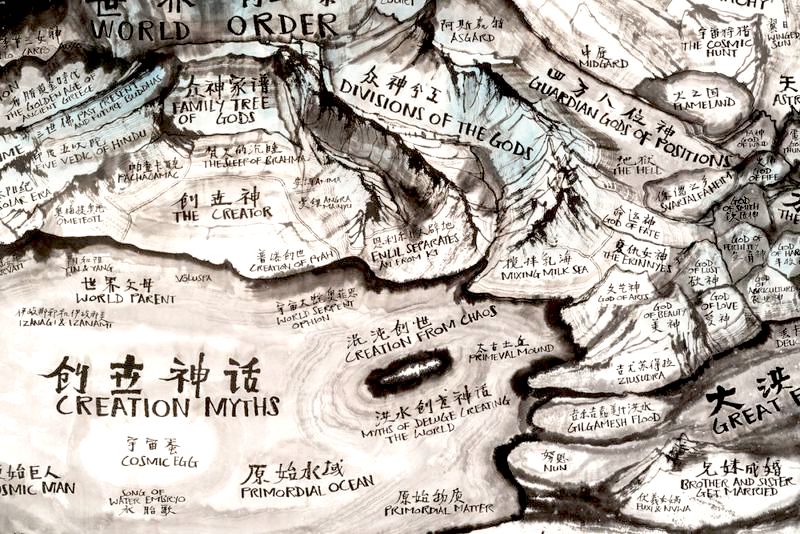
Qiu Zhi Jie, China, Map of Mythology, 2019.
Albanese walked into the meeting with Xi hoping to end China’s trade restrictions on Australia. He left with optimism that the $20 billion restrictions imposed in 2020 would be lifted soon. “It will take a while to see improvement in concrete terms going forward,” he said.
However, there is no word from China about removing these restrictions, which limit the import of Australian barley, beef, coal, cotton, lobsters, timber and wine.
These restrictions were triggered by then Prime Minister of Australia Scott Morrison’s insinuation that China was responsible for the Covid-19 pandemic.
Before that, in 2018, Australia’s government banned two Chinese telecommunications firms, Huawei and ZTE, from operating in its jurisdiction. This was not a trivial policy change, since it meant a drop from $19 billion in Australia’s trade with China in July 2021 to $13 billion in March 2022.
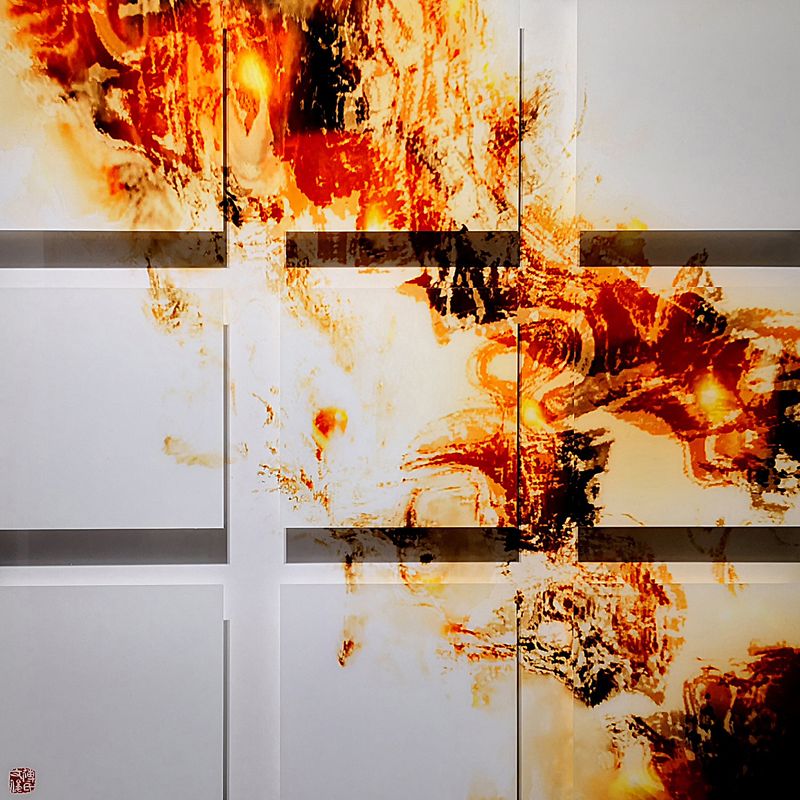
Fu Wenjun, China, Red Cherry, 2018.
During the meeting in Bali between Albanese and Xi, the Australian side presented a list of grievances, including Beijing’s restrictions on trade and Australia’s concerns about human rights and democracy in China. Australia seeks to normalise relations in terms of trade while maintaining its expanded military ties with the United States.
Xi did not put anything on the table. He merely listened, shook hands and left with the assurance that the two sides would continue to talk. This is a great advance from the ugly rhetoric under Scott Morrison’s administration.
In October, China’s ambassador to Australia, Xiao Qian, gave an address in anticipation of the 50th anniversary of diplomatic relations between Australia and China, which will be celebrated on Dec. 21. During this talk, Xiao asked his Australian counterparts if they saw China as “a champion or a challenger” of the international order. Australia’s government and press, he suggested, sees China as a “challenger” of the U.N. Charter and the multilateral system. However, he said, China sees itself as a “champion” of greater collaboration between countries to address common problems.
The list of concerns that Albanese placed before Xi signals that Australia, like the U.S., continues to treat China as a threat rather than a partner. This general outlook towards China makes any possibility of genuine normalisation difficult. That is why Ambassador Xiao called for Australia to have “an objective and rational perception” of China and for Canberra to develop “a positive and pragmatic policy towards China.”
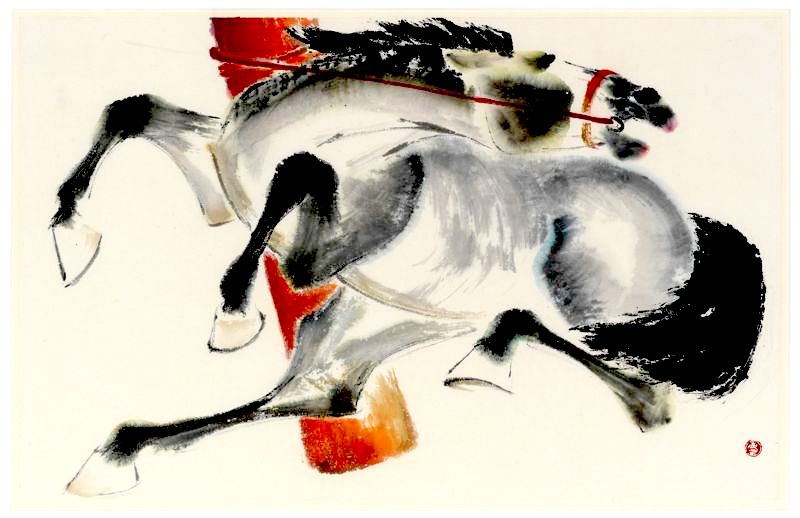
Zeng Shanqing, China, “Vigorous Horse,” 2002.
Growing anti-Chinese sentiment within Australia poses a serious problem for any move towards normalisation.
In July, China’s Foreign Minister Wang Yi said that Australia would have to “correct” several of its views on China before relations could advance. A recent poll shows that three-quarters of Australia’s population believes that China might be a military threat within the next two decades. The same survey showed that nearly 90 percent of those polled said that the U.S.-Australia military alliance is either very or fairly important.
At the Shangri-La Dialogue in Singapore earlier this year, Australia’s Deputy Prime Minister and Defence Minister Richard Marles said that countries must engage each other through dialogue and diplomacy. “China is not going anywhere. And we all need to live together and, hopefully, prosper together,” he said.
That Albanese and Xi met in Bali is a sign of the importance of diplomacy and dialogue. Albanese will not be able to get the trade benefits that Australia would like unless there is a reversal of these attitudes and the U.S.-Australia military posture towards China.
Vijay Prashad is an Indian historian, editor and journalist. He is a writing fellow and chief correspondent at Globetrotter. He is an editor of LeftWord Books and the director of Tricontinental: Institute for Social Research. He is a senior non-resident fellow at Chongyang Institute for Financial Studies, Renmin University of China. He has written more than 20 books, including The Darker Nations and The Poorer Nations. His latest books are Struggle Makes Us Human: Learning from Movements for Socialism and, with Noam Chomsky, The Withdrawal: Iraq, Libya, Afghanistan, and the Fragility of U.S. Power.
This article is from Tricontinental: Institute for Social Research.
The views expressed are solely those of the author and may or may not reflect those of Consortium News.
Support CN’s
Winter Fund Drive!![]()
Or securely by credit card or check by clicking the red button:


If only economic self-interest was the only primary good to be considered
Thanks, Vijay, for your analysis of the economic and military conundrums of our region. Similar analyses were published in the past involving Stalinist USSR and even Nazi Germany. If only economic self-interest was the primary good.
Dear Vijay,
Your patience and diligence are again on display in this wonderful essay. Thank you for its detail and your rigor. I celebrate an easing of tension with China should that come. Sadly, Australia dances to the USA’s tune as is well demonstrated by the increasing presence of USA military in the Northern Territory. The Pine Gap installation is quiet another matter. Was it not that Gough Whitlam threatened to withdraw permission for it, or that the USA should pay for it?
I wish to thank you for your inclusion of visual art in your essays. It is not that I “like” all of the art, but that I commune with you in acknowledging the importance of art in culture. I did particularly enjoy the work by Qiu Zhi Jie, China, Map of Mythology, 2019.
Thank you for your work.
Very pleased & pleasantly supprised by the comments above. It makes me wonder where the figures came from for the polls, allegedly taken of a cross section of “Ockers”. I’m a Kiwi and am increasingly worried about the future of the world.
On matters of trade and security Australia is “straddling a barbed wire fence”, to use a local expression. While the local security establishment and media and elements of the political classes compete with one another in expressions of obsequious loyalty and imperial devotion, it was ever thus. Australia was established as an imperial colony and despite empty bluster has never achieved independence. The closest we came was under the Whitlam ministry, and we all know how that ended. As good little vassals we were spared the Pinochet treatment, although make no mistake, that lesson was heeded. (The next labour Prime Minister to be elected was later acknowledged to be a US intelligence asset.) It should be noted however that in 1942 Australia switched its allegiance to the new imperial capital; notwithstanding all the endless protestations of eternal devotion to former imperial capital. What is less well known is that in 1942 Australia had a contingency team ready switch allegiance to Tokyo should that prove necessary. My point is that we are set up as a vassal state and will reorient to a new imperial centre of gravity as soon as that becomes evident.
So, Australia is trying to “have a bob each way” to use another local expression.
You would think Australia would know the USA was responsible for the pandemic thru their GoF research which they moved to Wuhan. Just another colonialist white country that wants to take over the world like the rest. I guess Australians don’t know about Premier of China Zhou Enlai who created the Five Principles of Peace in 1953. So wish these nations would pull their heads out to the perfume of their own rear ends.
Australia’s racism is nothing new. I visited Australia back in 1984 and, while just having arrived in Cairns, while spending an evening having a drink at the hotel bar, an Australian asked me what I thought of “our coons”. The white race is shit disturbing all over the planet and causing disturbances all around.
Just another example of the U.S. government spreading hate and discontent so U.S. defense industries can sell product.
As long as the U.S. government continues this madness I see no help for the planet in sight.
mgr has it right, I have nothing else to say other than, “You Aussies best wake the %#@k up!” and heed the mgr warning.
robert: Thank you very much. Sometimes I simply despair. You put it neat and to the point!
Thank you, now if only we could get these murderous bastards to release Assange.
You would think that by now the thought woiuld occur to them how Dog damned ridiculous this make their foolish asses look!
I entirely agree with each of the above comments. I am 76 and born and live in Australia. Over the past (I don’t know how many) decades I am increasingly amazed and embarrassed at our political system and its so called leaders. Currently I worry that the US is setting us up as the fall guys for a major war with China far from its own shores. Much like the Ukrainians.
Jack Flanigan
I think you are right. It’s how the USA operates.
Thank you Paula, Australia is geographically ideally situated to be the Swissland of the Indian Pacific region.
Friends with everyone and beholden to none. That will never happen.
Jack Flanigan
Was this an expose or an art show.
Insofar as Australia vis a vis China, it appears that Australia has contracted America’s stupid bug. As the article states, China is Australia’s most significant trading power and Australia seems to want to bin it. Australia would do well to notice the predicament the EU is in after following the US into the Ukraine blindly and willy-nilly. Australia will pay, like the EU, for it’s unbridled support of US warmongering.
An excellent article which covers al the main points. As an Australian
(not living in Australia) I have been ashamed and embarrassed by the public performance 0f Morrison and Dutton in treating Chinese leaders as they were treated in the 19th century. That pair clearly revealed that they do not understand what China has achieved since 1949 for its people. One can only hope that the new Australian government does better even, if they feel under pressure by US Governments.
Sad news. Self-determination or policies for the benefit of one’s own country and people that contradict US strategic interests to any degree are simply not allowed in America’s vassal states like Australia. Therefore, a multi-year or decade psych-op plan ensues to transform the Australian public’s perception of China so that the US’s perpetually belligerent posture toward China and the rest of the world seems reasonable, instead of lunatic. Except for a few crumbs that may inadvertently fall off the table, do the Australian people imagine that they will benefit from this?
It’s not like this is the first time, nor will it be the last. The US foreign policy playbook, after all, is not hidden away but resides in plain sight. You would think that a rational, educated people would actually read it and understand what it foretells in practical terms for them. It begins with years of psych-ops that enlist local provocateurs and evolves into assuming a perpetual bent over posture where one’s buttocks are elevated for easy entry. Sadly, the Australian people are now joining this “elite” club for real in which they willingly abandon their own best interests in return for…, well, nothing at all for them (note the EU). Instead, after the US manufactures a conflict for its own interests, and far from its own shores, it will guarantee to protect them, to the very last Australian! Of course, they must also purchase their “super weapons” from the US as well. How do you save a people from themselves? No doubt, the native kangaroo population is having a good laugh.
Australia is committing economic suicide.
Oops. Australia is a still White island in the midst of a multi-billion people non-White region, yet, despite its slowly changing race demographic due to immigration, is building its military fortifications and attack forces that invites retaliation. How stupid is that?
What kind of venom does the US inject into other countries that makes them abandon all self-interest and become its willing slaves?
The ‘venom’ you mention could be called ‘terrific PR machine’…making anyone believe that which suits the US for its multi faceted nefarious purposes.